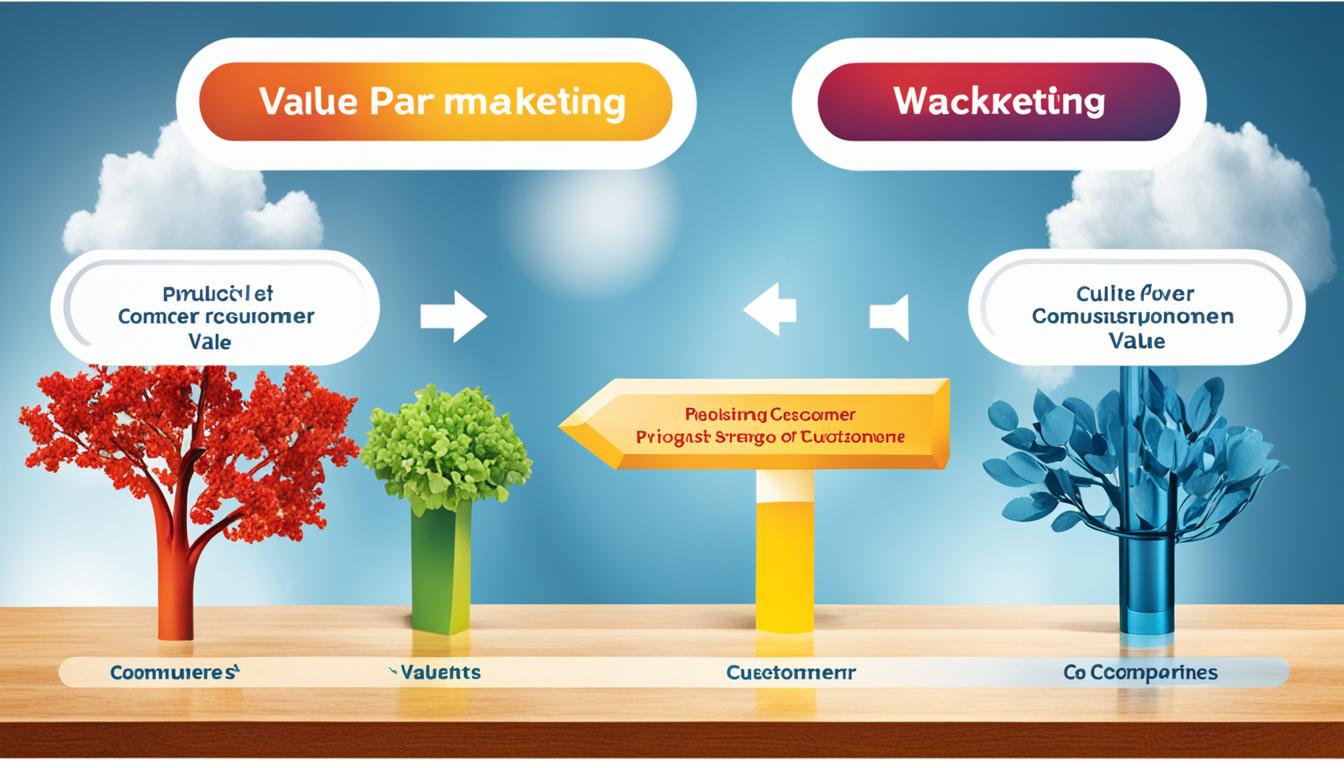Corporate marketing is a powerful strategy that companies use to promote their brand identity and strengthen customer relationships. It focuses on branding strategies and messaging tactics to improve brand image and engage with the target audience. By implementing effective corporate marketing strategies, companies can increase their marketing ROI and establish themselves as industry leaders.
In this article, we will explore the concept of corporate marketing and its key components. We will delve into the importance of branding strategies, customer-centric marketing, uniqueness, and brand identity. Additionally, we will provide real-world examples that demonstrate the success of corporate marketing in action.
Understanding the intricacies of corporate marketing is essential for businesses looking to build a strong brand presence and create meaningful connections with their customers. Let’s dive in!
Key Takeaways:
- Corporate marketing focuses on promoting the company as a whole and strengthening brand image.
- Effective branding strategies and customer-centric marketing are key components of successful corporate marketing.
- Being unique and maintaining a consistent brand identity are crucial for standing out from competitors.
- Providing exceptional customer service and utilizing social media platforms help enhance customer relationships.
- Creating valuable content, such as blogs, establishes brand authority and builds customer trust.
What is Corporate Marketing?
Corporate marketing is a strategic approach that focuses on promoting an entire company and its brand, rather than individual products or services. It encompasses various marketing activities, including branding and messaging, to attract new customers, engage leads, and delight existing customers. The goal of corporate marketing is to establish a strong brand image, foster customer loyalty, and build long-term relationships.
One of the key aspects of corporate marketing is understanding and targeting the right audience. By identifying the target audience’s needs, preferences, and behaviors, companies can tailor their messaging and communication tactics to effectively reach and engage potential customers. These tactics may include:
- Newsletters: Regularly communicating with the target audience through informative and engaging newsletters.
- Blogs: Creating relevant and valuable blog content that addresses audience pain points, provides solutions, and establishes the company as a thought leader in its industry.
- Email campaigns: Implementing targeted email campaigns to nurture leads and keep customers informed about company updates, promotions, and new offerings.
- Ads: Creating targeted advertisements across various channels, such as search engines, social media platforms, and websites, to increase brand visibility and attract potential customers.
- Social media: Leveraging social media platforms to connect with the target audience, share engaging content, and foster meaningful interactions.
Effective corporate marketing not only enhances brand awareness but also establishes a solid foundation for building trust, credibility, and positive customer experiences. By consistently delivering relevant and compelling messaging, companies can differentiate themselves from competitors, develop a unique brand identity, and cultivate lasting customer relationships.
| Key Aspects of Corporate Marketing | Benefits |
|---|---|
| Branding and Messaging | Establishes a strong brand identity and consistent messaging that resonates with the target audience. |
| Target Audience Focus | Enables personalized and tailored communication to effectively reach and engage potential customers. |
| Improved Brand Image | Builds brand awareness, credibility, and positive customer perceptions. |
| Enhanced Customer Relationships | Fosters loyalty, trust, and long-term relationships with customers. |
Alleviating Pain Points
One of the key strategies to enhance corporate marketing is by alleviating customer pain points through relevant content offers. By directly addressing their needs and providing valuable information, companies can build trust and foster customer loyalty. Content offers can take various forms such as free ebooks, educational videos, or bootcamp-style lessons, catering to different customer preferences. These initiatives serve the dual purpose of allowing customers to get acquainted with the brand and establishing authority in the industry. Moreover, they generate new leads and provide an opportunity for the brand to showcase its expertise.
When customers genuinely perceive a brand as helpful in alleviating their pain points, they are more likely to become brand advocates. These brand advocates can play a significant role in promoting the brand through word-of-mouth marketing and influencing their peers’ purchasing decisions. By offering valuable content that addresses pain points, corporate marketing can foster positive customer experiences and strengthen customer relationships.
Implementing customer-centric marketing strategies that focus on alleviating pain points contributes to building a customer-centric brand image. By genuinely understanding and addressing customers’ needs, companies can position themselves as trusted advocates and problem solvers. Content offers play a crucial role in this process, establishing a customer-centric foundation for corporate marketing.
Focusing on Customers
Successful corporate marketing requires a deep understanding of the target audience. By implementing customer-centric marketing strategies, companies can effectively cater to their customers’ needs, enhance customer satisfaction, and differentiate themselves in the market.
To gain valuable insights into customers’ preferences and pain points, conducting customer satisfaction surveys is essential. These surveys allow companies to collect feedback directly from their target audience, enabling them to refine their marketing strategies accordingly.
With the information gathered from customer satisfaction surveys, companies can tailor their marketing messages, content, and promotional activities to address the specific needs and preferences of their target audience. This targeted approach ensures that marketing objectives align with the customers’ expectations, enhancing brand awareness and customer engagement.
A customer-centric marketing strategy also enables companies to differentiate themselves from competitors. By understanding their customers’ unique needs and providing tailored solutions, companies can carve out a distinct market position and stand out from the crowd.
To illustrate the importance of customer-centric marketing, consider the following table:
| Company | Marketing Strategy | Differentiation |
|---|---|---|
| Company A | Generic marketing messages targeting a broad audience | Lack of differentiation, lower customer engagement |
| Company B | Customer segmentation and personalized marketing messages | Higher customer engagement, stronger brand loyalty |
| Company C | Customer satisfaction surveys to gather customer feedback | Well-informed marketing strategies, tailored customer experiences |
As shown in the table above, companies that prioritize customer-centric marketing strategies can differentiate themselves in the market, leading to increased customer engagement and loyalty.
Implementing customer-centric marketing not only enhances the customer experience but also allows companies to better understand their target audience, differentiate themselves in the market, and ultimately drive business growth.
Being Unique
An effective corporate marketing strategy is not just about delivering marketing messages; it’s about standing out from the competition. To achieve this, conducting a thorough competitive analysis is essential. By analyzing competitors’ strategies and identifying gaps, a company can unearth its unique value proposition.
Competitive analysis involves researching and understanding how competitors position themselves in the market. This analysis helps identify what sets the brand apart and highlights opportunities for differentiation. By leveraging this information, a company can develop a marketing strategy that effectively communicates its unique value proposition.
Communicating the brand’s unique value proposition is critical for brand differentiation. The unique value proposition typically highlights the distinctive benefits customers can expect from a particular brand. This differentiation can be achieved through messaging and marketing materials that emphasize what sets the brand apart from its competitors.
An effective marketing strategy should strategically align the brand’s unique value proposition with the target audience’s needs and desires. This alignment helps attract and resonate with customers who align with the brand’s values, resulting in more impactful marketing efforts.
By emphasizing what makes the brand unique, companies can create a compelling brand identity that resonates with their target audience. This brand identity serves as a strong foundation for marketing strategies and allows the brand to stand apart from competitors.
Here’s an example of a competitive analysis table showcasing differentiating factors for a clothing brand:
| Competitor | Differentiating Factors |
|---|---|
| Brand A | Organic and sustainable materials |
| Brand B | Affordable prices and fast shipping |
| Brand C | Unique and trendy designs |
| Brand D | Luxurious fabrics and personalized styling |
Identifying and emphasizing what makes the brand unique is a key component of a successful marketing strategy. By effectively communicating its unique value proposition and highlighting differentiation factors, a company can attract and engage customers who align with the brand, leading to long-term success.

Knowing Your Brand
Corporate marketing goes beyond simply selling a company. It involves promoting a lifestyle that aligns with the brand, as customers are more likely to make purchases from brands that resonate with their values and lifestyle choices. Establishing a strong brand identity and effectively communicating it to customers is crucial in this process. Brands like Trader Joe’s, known for their commitment to carrying organic and fresh products, have successfully created a defined brand that appeals to their target audience.
At the heart of effective corporate marketing is brand alignment, where the brand’s identity is carefully crafted to reflect its values, personality, and unique offering. This alignment ensures that the brand communicates a consistent message across all touchpoints, connecting with customers on a deeper level.
Lifestyle marketing plays a significant role in corporate marketing as it taps into consumers’ desires to associate themselves with a particular lifestyle or persona. By showcasing a lifestyle that aligns with the brand’s values, corporate marketing campaigns can attract and resonate with the intended audience.
Central to a successful corporate marketing strategy is brand messaging. The messages conveyed should be aligned with the brand’s identity and unique value proposition. Consistency in brand messaging helps build recognition, trust, and loyalty among customers.
Brand Identity
A strong brand identity is the foundation of effective corporate marketing. It encompasses the visual elements, tone of voice, values, and personality that distinguish a brand from its competitors. A well-defined brand identity helps customers recognize and relate to the brand, fostering trust and loyalty. It is crucial to invest time and effort into developing a brand identity that accurately reflects the essence of the brand.
Lifestyle Marketing
Lifestyle marketing is a powerful approach that appeals to customers’ aspirations and desires. By showcasing a lifestyle that aligns with their target audience’s values, brands can create emotional connections and foster deeper relationships. Lifestyle marketing campaigns often feature relatable stories, imagery, and experiences that resonate with the target audience, inviting them to become a part of the brand’s lifestyle.
Brand Messaging
Brand messaging is the articulation of a brand’s value proposition, mission, and positioning. It involves crafting compelling messages that convey the brand’s unique qualities and resonate with the target audience. Consistency in brand messaging across various marketing channels helps reinforce the brand’s identity and build trust among customers.
Elements of Brand Identity
| Visual Elements | Tone of Voice | Values | Personality |
|---|---|---|---|
| Logo design | Language style | Ethics and principles | Brand character |
| Color palette | Messaging style | Cultural alignment | Attitude and demeanor |
| Typography | Tone and mood | Social responsibility | Brand voice |
By paying attention to brand identity, brand alignment, lifestyle marketing, and brand messaging in corporate marketing efforts, brands can effectively promote their unique value proposition and connect with their target audience in a meaningful way.
Being Intentional with Brand Voice
A strong brand voice is crucial for effective corporate marketing. It sets the tone and personality of a brand, creating a unique style that resonates with the target audience. Consistency in language and communication style is essential to establish messaging consistency and build brand recognition. By being intentional with brand voice, companies can differentiate themselves from competitors and foster a deep connection with customers.
When developing a brand voice, choosing the right words is key. Each word should reflect the brand’s values, mission, and identity. Whether it’s a formal and informative tone or a playful and friendly approach, the brand voice should remain consistent across all marketing channels and touchpoints.
One effective strategy is to create a fictitious persona or character that embodies the brand’s voice. A great example is TheSkimm’s “Skimm Girl,” a relatable character that represents the brand’s perspective and engages the target audience. This unique approach adds personality to the brand’s messaging, making it more relatable and memorable.
Incorporating a unique brand voice into corporate marketing efforts helps build recognition and establishes a strong brand personality. When customers encounter consistent and engaging brand messaging, they are more likely to connect with the brand on a personal level and develop a sense of loyalty and trust.
To summarize, being intentional with brand voice is a crucial aspect of effective corporate marketing. By establishing messaging consistency, adopting a unique style, and developing a distinct brand personality, companies can differentiate themselves in a competitive market and build strong, lasting relationships with their target audience.

Providing Great Customer Service
Customer service is an integral part of a successful corporate marketing strategy. It goes beyond advertising and messaging, playing a crucial role in shaping the brand’s identity and reputation. By delivering excellent customer service, companies can not only satisfy their customers but also generate positive word-of-mouth marketing and customer advocacy. Exceptional customer service has the power to attract new customers, reinforce brand loyalty, and enhance overall brand perception.
Zappos is a prime example of a brand that is renowned for its outstanding customer service. Their commitment to going above and beyond for their customers has contributed significantly to their reputation and success. By integrating exceptional customer service into their corporate marketing strategy, Zappos has built strong relationships with their customers and created a positive brand image in the minds of consumers.
Integrating customer service into the corporate marketing strategy involves prioritizing customer satisfaction and ensuring the highest level of service at every touchpoint. Brands should focus on promptly addressing customer inquiries and concerns, providing personalized solutions, and exceeding customer expectations. By consistently delivering exceptional customer service, brands can develop a reputation for reliability and reliability, which forms the foundation for positive word-of-mouth marketing.
Customer service acts as a direct reflection of a company’s brand identity. It showcases the brand’s commitment to customer satisfaction and demonstrates its values and principles. A strong brand identity goes hand in hand with great customer service, creating a positive customer experience that resonates with customers long after their interaction with the brand. By focusing on providing exceptional customer service, brands can reinforce their brand identity and leave a lasting impression on customers.
Word-of-mouth marketing, influenced by positive customer experiences, is a powerful tool for corporate marketing. Satisfied and loyal customers become brand advocates, sharing their positive experiences with friends, family, and online communities. These recommendations can significantly impact a brand’s reputation and attract new customers. By delivering exceptional customer service consistently, brands can harness the power of word-of-mouth marketing and create a loyal and engaged customer base.
| Benefits of Providing Great Customer Service |
|---|
| Enhances brand perception |
| Generates positive word-of-mouth marketing |
| Fosters customer loyalty and advocacy |
| Attracts new customers |
| Reinforces brand identity and values |
Having a Social Media Presence
Social media marketing has become an integral part of corporate marketing strategies. It offers tremendous opportunities for brands to connect with their audience, showcase their brand personality, and build strong customer relationships. By leveraging the power of social media platforms, companies can engage in two-way communication, understand customer needs, and reinforce their brand image.
Brands that establish a strong social media presence create a sense of community among their followers, fostering a deeper connection with their audience. Social media platforms provide a unique space for brands to humanize their company, share behind-the-scenes content, and interact with customers on a more personal level.
Enhancing Customer Relationships Through Two-Way Communication
Social media platforms enable brands to have direct and immediate communication with their customers. By actively engaging in conversations, responding to comments, and addressing concerns, companies can demonstrate their commitment to customer satisfaction. This two-way communication not only helps build trust but also provides valuable insights into customer preferences and needs.
Showcasing Brand Personality and Values
Social media offers a platform for brands to showcase their unique brand personality and values. Through carefully crafted posts, companies can express their brand’s voice, tone, and identity, creating differentiation in a crowded market. By consistently aligning messaging and content with their brand persona, companies can establish a cohesive and recognizable presence on social media.
Creating a Sense of Community
Social media platforms provide an excellent opportunity for brands to foster a sense of community among their followers. By encouraging user-generated content, hosting contests, and initiating discussions, companies can build a loyal following and encourage brand advocacy. This sense of community not only strengthens customer relationships but also enhances brand loyalty and boosts customer retention.
| Social Media Marketing Benefits | Examples |
|---|---|
| Increased brand visibility | Starbucks’ active presence on Instagram and Twitter |
| Improved customer engagement | Wendy’s clever and humorous Twitter interactions |
| Opportunity for direct customer feedback | Apple’s customer support on Twitter |
| Ability to attract and engage younger demographics | Taco Bell’s creative content on TikTok |
As social media continues to evolve, it remains an essential component of corporate marketing strategies. By harnessing the power of social media marketing, brands can effectively engage with their audience, promote a strong brand personality, facilitate two-way communication, and build long-lasting customer relationships.
Writing a Blog
Creating and maintaining a blog is an essential component of a successful corporate marketing strategy. A blog offers a platform for brands to engage with their target audience, establish themselves as thought leaders in their industry, and build trust and brand authority. By providing valuable and educational content, brands can attract and retain customers, ultimately driving customer trust and loyalty.
A well-written blog allows brands to showcase their expertise and knowledge while addressing customer pain points and answering their questions. Through consistent delivery of helpful information, brands can position themselves as trusted sources of valuable content and establish thought leadership in their respective fields. This can lead to increased brand recognition and customer trust, as readers perceive the brand as knowledgeable and reliable.
Moreover, blogging provides an opportunity for brands to distinguish themselves from their competitors. By sharing unique insights, perspectives, and experiences, brands can set themselves apart and create a distinct brand identity. This differentiation is crucial in a crowded marketplace, allowing brands to attract a loyal following of customers who resonate with their values and offerings.
The Benefits of Blogging for Corporate Marketing:
- Establishing brand authority: a blog enables brands to showcase their expertise and knowledge, positioning themselves as thought leaders in their industry.
- Building customer trust: by consistently providing valuable and educational content, brands can establish trust with their audience and foster long-term relationships.
- Increasing brand visibility: blogging improves a brand’s online presence, boosting search engine rankings and attracting organic traffic.
- Driving customer engagement: blogs allow for two-way communication with readers, encouraging feedback, comments, and social sharing.
- Gaining market insights: through blog analytics and reader interactions, brands can gather valuable data and insights about their target audience’s preferences and needs.
| Blogging Best Practices | Description |
|---|---|
| Consistent Content Schedule | A regular posting schedule helps keep readers engaged and establishes reliability. |
| Keyword Research | Researching relevant keywords boosts blog visibility in search engines and attracts targeted traffic. |
| Quality Writing | Well-written and engaging content maintains reader interest, encourages sharing, and reflects positively on the brand’s image. |
| Visual Content | Including images, infographics, and videos enhances the blog’s visual appeal and facilitates information retention. |
| Internal and External Linking | Strategically linking to relevant internal and external resources improves SEO, reader experience, and authority. |
| Call-to-Actions | Including clear and compelling calls-to-action encourages readers to take the desired next steps, such as subscribing, contacting the brand, or downloading a resource. |
Examples of Successful Corporate Marketing
Real-world marketing examples can provide valuable insights into effective corporate marketing strategies. By examining successful brands like Coca-Cola, Dollar Shave Club, Nike, and Busch Light, we can uncover various tactics that have contributed to their brand promotion and growth.
Coca-Cola: Tapping into Emotional Marketing
One of the most iconic examples of corporate marketing is Coca-Cola. Their campaigns have consistently focused on creating emotional connections with their audience. Whether it’s through heartwarming holiday ads or campaigns that celebrate diversity and inclusivity, Coca-Cola has mastered the art of storytelling to evoke strong emotions in consumers.
Dollar Shave Club: Disrupting the Market with Humor
Dollar Shave Club disrupted the razor industry through their witty and humorous marketing campaigns. Their viral video, “Our Blades Are F***ing Great,” garnered millions of views and showcased their brand personality. By leveraging humor, Dollar Shave Club was able to engage their target audience and differentiate themselves from traditional razor brands.
Nike: Inspiring Audiences through Storytelling
Nike is known for its powerful storytelling in corporate marketing. Their campaigns often feature inspiring stories of athletes overcoming challenges and pushing their limits. By aligning their brand with the values of resilience, determination, and success, Nike has captured the hearts of consumers and positioned themselves as a leading athletic brand.
Busch Light: Understanding Their Target Audience
Busch Light, a popular beer brand, successfully targets their audience through relatable marketing campaigns. They understand their core demographic – young, adventurous individuals who enjoy outdoor activities and socializing with friends. By incorporating these elements into their marketing materials, Busch Light appeals to their target audience and builds a strong brand identity.
These real-world examples highlight the importance of branding strategies, emotional marketing, storytelling, and understanding your target audience. By implementing similar tactics in corporate marketing efforts, brands can forge stronger connections with their customers and drive business success.
Conclusion
Corporate marketing is an essential component for companies looking to establish a strong brand image and cultivate meaningful relationships with their customers. By gaining a deep understanding of the target audience and addressing their pain points, brands can create effective marketing strategies that resonate with their customers. Furthermore, being unique and differentiating yourself from competitors is key to standing out in the market.
Providing exceptional customer service and maintaining a strong social media presence are crucial elements in building customer trust and loyalty. By engaging with customers through various channels, brands can create a sense of community and reinforce their brand identity. Content marketing, such as blogging, further strengthens brand authority and thought leadership, showcasing the expertise and knowledge of the brand.
Real-world examples of successful corporate marketing strategies demonstrate the power of storytelling and emotional connections in creating memorable brand experiences. By incorporating these insights into their marketing strategies, companies can elevate their corporate marketing and establish a strong brand presence in the market. The key takeaways from corporate marketing include understanding the target audience, addressing pain points, being unique, providing exceptional customer service, and utilizing various marketing channels to connect with customers.
FAQ
What is corporate marketing?
Corporate marketing is the type of marketing that promotes a company as a whole, rather than individual products. It focuses on branding and messaging to attract new customers, engage leads, and delight current customers.
How does corporate marketing alleviate pain points?
Corporate marketing alleviates pain points by addressing customer needs with relevant content offers, such as free ebooks or educational videos. This builds trust, establishes authority, and generates new leads.
How does corporate marketing focus on customers?
Corporate marketing focuses on customers by understanding their preferences and pain points through customer satisfaction surveys. This ensures that marketing strategies align with customer needs and enhances brand awareness.
How does corporate marketing help a brand be unique?
Corporate marketing helps a brand be unique by conducting a competitive analysis to identify gaps in competitors’ strategies. By communicating the brand’s unique value proposition and emphasizing what sets it apart, it can attract customers who align with its values.
Why is knowing your brand important in corporate marketing?
Knowing your brand is important in corporate marketing because it helps establish a strong brand identity and clearly communicate it to customers. This alignment with customers’ values and lifestyle choices increases the likelihood of purchases and builds trust.
How does being intentional with brand voice contribute to corporate marketing?
Being intentional with brand voice contributes to corporate marketing by creating consistency in language and communication style. This helps customers connect with the brand on a personal level, sets the brand apart from competitors, and builds recognition.
What role does customer service play in corporate marketing?
Customer service plays a crucial role in corporate marketing as it shapes the brand’s reputation and enhances brand perception. Excellent customer service leads to positive word-of-mouth marketing, customer advocacy, and attracts new customers.
Why is having a social media presence important for corporate marketing?
Having a social media presence is important for corporate marketing as it allows brands to showcase their personality and connect with customers on a personal level. It strengthens customer relationships, fosters two-way communication, and reinforces the brand image.
How does writing a blog contribute to corporate marketing?
Writing a blog contributes to corporate marketing by providing valuable and educational content that positions the brand as a thought leader in its industry. It helps customers get to know the brand, builds trust, and establishes brand authority.
Can you provide some examples of successful corporate marketing?
Examples of successful corporate marketing include Coca-Cola, Dollar Shave Club, Nike, and Busch Light. These brands have effectively used various tactics like seasonality, storytelling, humor, and emotional connections to promote their brands and engage with their target audiences.
What are the key takeaways from corporate marketing?
Key takeaways from corporate marketing include understanding the target audience, alleviating pain points, being unique, and providing excellent customer service. Real-world examples demonstrate the effectiveness of these strategies and emphasize the importance of storytelling and emotional connections in marketing.







